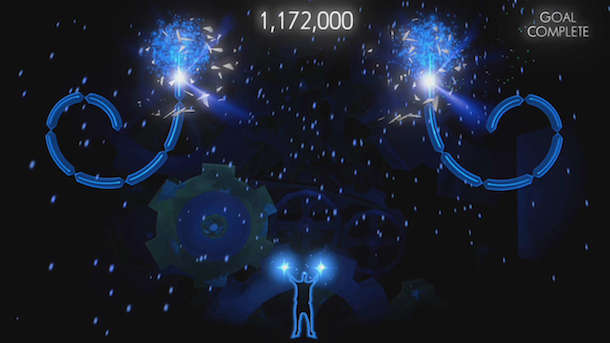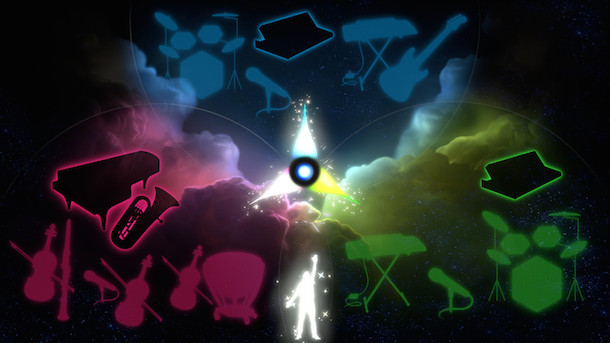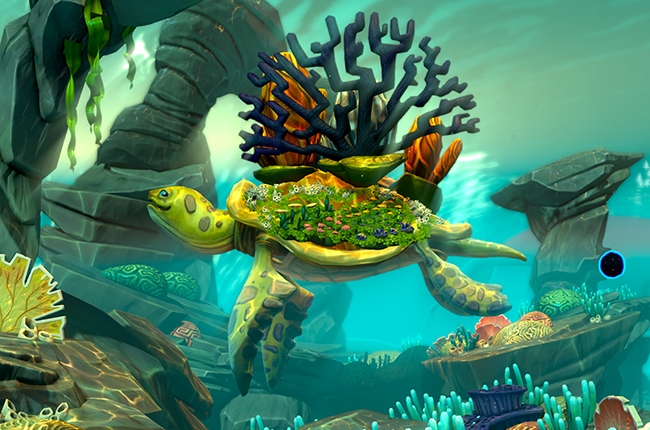Making a good rhythm game is hard. Making them a commercial success is even harder. No developer should be more aware of this than Harmonix, who spearheaded the late-2000s trend that burned bright and fast before collapsing in on itself like a burning star a few years later. When making game after game in the same genre, innovation is important. Fantasia: Music Evolved actually manages to approach a stale genre and introduce mechanics that allow the player interact with the game’s music in new and exciting ways.
As was the case with Dance Central, gone are the plastic peripherals and back are Kinect-tracked motion controls. Fantasia has you swiping, punching and tracing and holding on-screen note paths to the rhythm of different song components, as opposed to just dancing your way through. The motions take quite a bit of getting used to, for sure, but the game has (arguably at the expense of fun) an extremely lengthy tutorial structure to acclimate players to the new way of interaction.
Fantasia opens with a brief tutorial that quickly and effectively walks you through all of the game’s base mechanics, but you’re then thrust into over an hour of standalone tutorials going over each of the mechanics it taught you literally minutes earlier. It felt more like a slog than anything else, and at times really made me want to just put it down and walk away. The game’s lengthy load times when starting a song, returning to the overworld or viewing cutscenes certainly didn’t make the experience any less frustrating.
The control scheme works great once you get a feel for it, but a lot of people are going to have trouble as it is drastically more abstract than those of Harmonix’s previous games. Granted, in practice the actions you’re performing are near identical to those of Apprentice Mickey in the original source material, but people generally have more of a foundation for making music by means other than what is essentially hand dancing, and the game doesn’t do a great job of giving immediate feedback to help ease the transition.

There’s always been a hard, tactile response in previous Harmonix games that let the player know if they were doing well. It was blatantly obvious when you had a plastic instrument in your hands; Guitar Hero and Rock Band gave instant feedback if you were screwing up, killing the note chain and throwing a cacophony of horrible noises at you. Even in the Dance Central games I’ve felt like I had a handle and knew exactly whether or not I hit a motion correctly despite it being essentially the same type of thing as Fantasia. In Fantasia, however it took a long time for me to feel like I had a decent grasp of whether or not I was hitting the motions right or just flailing around helplessly.
The new Kinect sensor does an admirable job of keeping up, for sure. It has a tendency to trip up at the most inopportune moments, usually when switching tracks or something similar. However, small hiccups aside, it really does do a great job most of the time, and feels way more accurate in this context than the original sensor, as one would assume it would, so new players shouldn’t have much issue.
There are generally three different versions to every song, usually a studio recording and two remixes, and the track list is eclectic enough that it seems to cover most of the bases genre-wise. On top of the standard tracks, the various mixes can transform a song into something different altogether, and the “Composition Spells” let you create new measures, effects and other musical elements that will exist as loops for the rest of the track. It’s a really impressive level of interaction with the music, to the point where a fully tricked out song can be damn near unrecognizable to the original track. It even lets you save the transformed track after the fact, so if you want to hang on to that dope remix of The Police’s “Message in a Bottle,” you totally can.
All of that is wonderful, but it also surrounds my biggest issue with the game. The first time you play any of the songs, only one of those three tracks is unlocked. In order to unlock the second, you then have to play through the same song again and reach a certain target score. To unlock the last of the tracks for that song, you have to play it yet again, hitting yet another target score. You also need to unlock the composition spells separately, meaning they wont appear in the songs that include them until you’ve satisfied the requirements set forth in the main campaign.

If that sounds like unnecessary padding, it’s because that’s exactly what it is. Rhythm games, while not as plentiful as they once were, generally didn’t gate content like this. Even Fantasia’s predecessors never locked away content to this extent, as it was usually a one-and-done type of situation. It’s especially egregious because the game is also locking out mechanics — mechanics that the game desperately needs in order to stay interesting.
The game does feature a “Party Mode” that unlocks all of the songs, remixes and composition spells, with the trade-off of gating the ability to complete challenges or unlock achievements. It’s an accurate name and a great way to noodle around with what the game has to offer without dealing with its many frustrations, or if you wanted to share it with others, and from the few multiplayer experiences I’ve had thus far, it’s certainly a solid option for a bunch of people to dip in and out of on a Saturday night.
It’s strange, but after all this time with the game I can’t really tell who Fantasia: Music Evolved is for, exactly. On one hand, it’s overly kid-friendly, which is understandable. However, with no difficulty settings to speak of, I’m not sure how younger players would adjust to the learning curve. This especially evident in multiplayer, where others playing may not be as down with Fantasia’s strange language, having not spent hours acclimating to it.
There’s a lot to like about Fantasia: Music Evolved, and once you get to the real meat of it, it’s a wonderful, demanding experience much unlike any rhythm game I’ve ever played. It’s for that exact reason that Harmonix’s need to lock all of that content away, essentially holding it hostage until you complete hours of mind-numbing monotonous activity all the more heartbreaking.
What it ultimately comes down to is this: If you’re willing to put the time in to get to the good stuff, by all means, pick up Fantasia, you won’t regret it, I promise. If you’re not, though, I can’t guarantee you’ll have much fun at all, and that’s a damn shame.
This review is based on a retail code sent to SideQuesting by the publisher for the Xbox One.


1 Comment